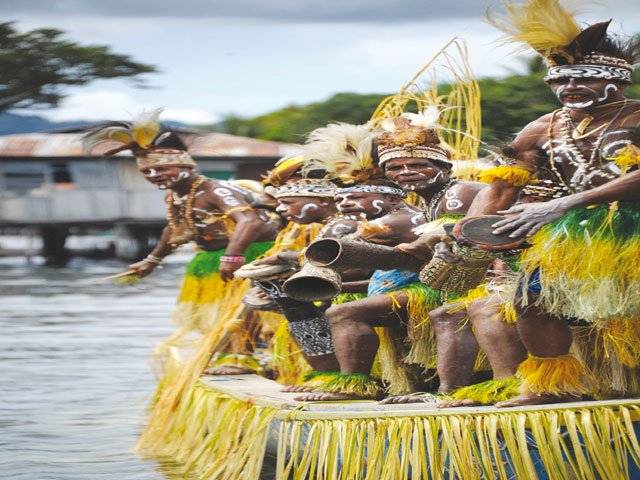SENTANI, Indonesia (AFP) - For decades, the only foreign visitors to venture into Papua were gold-diggers, anthropologists, missionaries and soldiers fighting imperial wars. But the vast, western half of New Guinea island is slowly opening its doors to tourists as a "hidden paradise", a land of ancient tribal cultures, glittering reefs, soaring glaciers and teeming wildlife. Recreational travellers are still few, at most a few thousand a year; people like Sarah Gabel, a 29-year-old American who says she is "captivated by people who live in harmony with nature". That's what she found in the Baliem valley, the long-isolated home of the Dani tribe high in the Papuan central highlands, outside the town of Wamena. "I made a one-week trek. I crossed rivers in the wild, slept in huts and met semi-naked men hunting wild boars with arrows," she said. This kind of "ethnic tourism" has become the main market for New Guinea, the largest island in Asia, where a thousand indigenous tribes are divided between the independent state of Papua New Guinea to the east and the Indonesian-controlled provinces of Papua and West Papua to the west. "The clients come mostly from Europe and the US. They don't look for five-star hotels but want to discover unknown territories and authenticity," explained Iwanta Perangin-Angin, whose agency, Papua Adventure, offers stays in Baliem. Packed with exotic wildlife, Papua also attracts nature buffs and ornithologists in search of birds of paradise and cockatoos. Environment group WWF this week announced the discovery of more than 1,000 new species on New Guinea, including a frog with fangs and a round-headed dolphin. "Papua is a hidden paradise. It's a unique destination with a lot to offer, from wild beaches to high mountains and deep jungle, with a strong culture and beautiful art," Trisakti University Institute of Tourism Professor Azril Azahari said. "It's a niche market because it's very expensive and visitors need to be in good shape to support the climate, the hilly landscape and the very basic transport." And then there's the political situation. Indonesian troops are accused of widespread human rights abuses against indigenous tribes which have been waging a low-level separatist war since the 1960s, often armed with little more than slings and arrows. Foreign journalists and aid workers are barred from visiting the resource-rich provinces of Papua to report on the rebellion.
Saturday, April 20, 2024
Indonesia's 'paradise lost' opens

Pak economy improving, funds will be provided on request: IMF
9:57 PM | April 19, 2024
Minister advocates for IT growth with public-private collaboration
9:57 PM | April 19, 2024
Judges' letter: IHC seeks suggestions from all judges
9:55 PM | April 19, 2024
Formula 1 returns to China for Round 5
9:05 PM | April 19, 2024
Germany head coach Julian Nagelsmann extends contract till 2026 World Cup
9:00 PM | April 19, 2024
A Tense Neighbourhood
April 19, 2024
Dubai Underwater
April 19, 2024
X Debate Continues
April 19, 2024
Hepatitis Challenge
April 18, 2024
IMF Predictions
April 18, 2024
Kite tragedy
April 19, 2024
Discipline dilemma
April 19, 2024
Urgent plea
April 19, 2024
Justice denied
April 18, 2024
AI dilemmas unveiled
April 18, 2024
ePaper - Nawaiwaqt
Advertisement
Nawaiwaqt Group | Copyright © 2024





